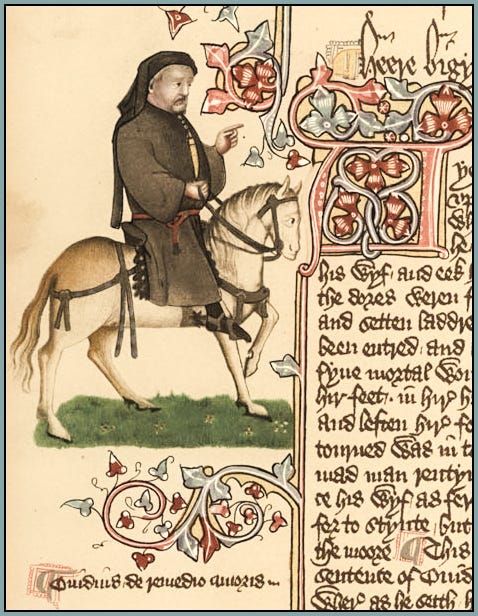The Matrimonial Theology of ... Geoffrey Chaucer
The Canterbury Tales show us that England’s most famous medieval poet thought a great deal about marriage.
The recently concluded series on medieval marriage dealt with some emotionally heavy and theologically complex and socially delicate issues. That wasn’t an easy series to write: sexual ethics, the place of matrimony and conjugal pleasure in the hierarchy of Christian life, the confusing testimonies of the saints, the hard teachings of the patristic and medieval Church—these are things that strike deep into our basic notions of who we are, and why we live the way we do, and what our faith is really about, and how we relate to the people we care most about on this earth. In any case, I think that our study of the topic was a highly productive one, and I’m especially grateful to those who contributed to the discussion via the comments section.
Before we move on to some new topics, I want to conclude our reflections on Christian matrimony with something a bit lighter and more literary. To that end, today we’ll be talking about marriage as it was perceived and portrayed by Geoffrey Chaucer—author of The Canterbury Tales (among other major works), foremost English poet of the Middle Ages, and bold satirist whose insights were keen, whose wit was seemingly inexhaustible, and whose ideas were sometimes questionable.
However, beyond whatever interest and enjoyment we find in Chaucer’s poetic treatments of wedlock, his matrimonial “theology” is significant for our understanding of medieval culture: we see in various passages from The Canterbury Tales that Chaucer, neither a cleric nor an ecclesiastical scholar, was well acquainted with the Church’s teaching on matrimony and was sensitive to the ethical complexities of married life.
His writings also show us that medieval society, unfortunately like modern society in this respect, did not lack for cynical lore about the woes of marriage and, more specifically, of wives. I won’t be discussing any of those passages, which are not to my taste.

Geoffrey Chaucer (c. 1343–1400) was a remarkably gifted wordsmith and storyteller, but his role in English culture extends far beyond what we might normally expect from a literary author. Not merely a poet, Chaucer was a vernacular poet, writing superb verse in the still-maturing language now called Middle English (instead of Latin or Anglo-Norman French), and he also used the vernacular for a technical treatise (on the astrolabe) and a translation of Boethius’ Consolation of Philosophy (which was a text of immense importance for scholars of the medieval West). Thus, Chaucer was a pivotal figure in leading the English language, and therefore also the English nation, into a new realm of cultural achievement.
Keep reading with a 7-day free trial
Subscribe to Via Mediaevalis to keep reading this post and get 7 days of free access to the full post archives.




